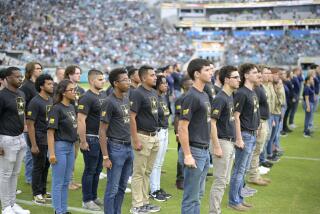‘One Minute We’re Going, the Next Minute We Ain’t’
- Share via
AN ARMY CAMP IN KUWAIT — The words stenciled on the barrel of Staff Sgt. Charles Wooten’s M1A1 Abrams tank describe the attitude of his 3rd Infantry Division: carpe diem.
The soldiers would like to “seize the day” -- this day, not tomorrow or next week.
“Get this [war] over with,” Wooten said after his crew calibrated the sighting on the tank’s thick barrel, an exercise they’ve done dozens of times since arriving in November.
“One minute we’re going, the next minute we ain’t,” the Meridian, Miss., native said. “You can only sharpen the knife so many times.”
Each day, Capt. Steven T. Barry and other officers of Company C huddle around a shortwave radio waiting for word that they will move from their rudimentary camp. Little information comes down the chain of command.
A man of few words, Barry tries to keep his soldiers happy, joining them in tossing a football. When dusk falls, they strap luminescent vials to the ball and keep playing, the pigskin tracing Day-Glo green arcs against an indigo desert sky.
Well-thumbed copies of Maxim, Flex and Sports Illustrated provide further diversion. In this camp -- which no one likes enough to give a name -- soldiers shave with cold water in the morning and shower with solar bags left to hang in the sun. There are two shower stalls for nearly 80 people, standing like vertical plywood coffins at the edge of camp.
Sgt. Anthony Smith pointed to the steel tines of the mine-clearing plow affixed to his Abrams, “Crazy Horse.”
“That’s Saddam’s point right there, and that one is for Osama bin Laden,” the New Jersey native said.
“Everybody’s been frustrated so long we don’t even consider it frustration anymore, just anticipation,” he said. “I just want revenge. I want some blood.”
Officers say they fear that frustration over political and diplomatic maneuvering will be hard to restrain on the battlefield, where the laws of conflict require measured violence.
Smith, something of an elder statesman at 35, joined the Army at the start of the Persian Gulf War in 1991 but watched the conflict end while still in boot camp. Since then he’s been trying to add “combat” to his resume, like his father, uncles and grandfather.
It has long since dawned on him and his fellow soldiers that the way out of this predicament probably will pass through Baghdad. They are eager to start plowing that road through the sand.
“I’m not a warmonger,” Wooten said. “It’s bad when you go to bed saying, ‘Help me, Jesus, let there be a war soon.’ It’s wrong. I’m praying to put my men in danger, so I can go home. That’s wrong.”
More to Read
Sign up for Essential California
The most important California stories and recommendations in your inbox every morning.
You may occasionally receive promotional content from the Los Angeles Times.














